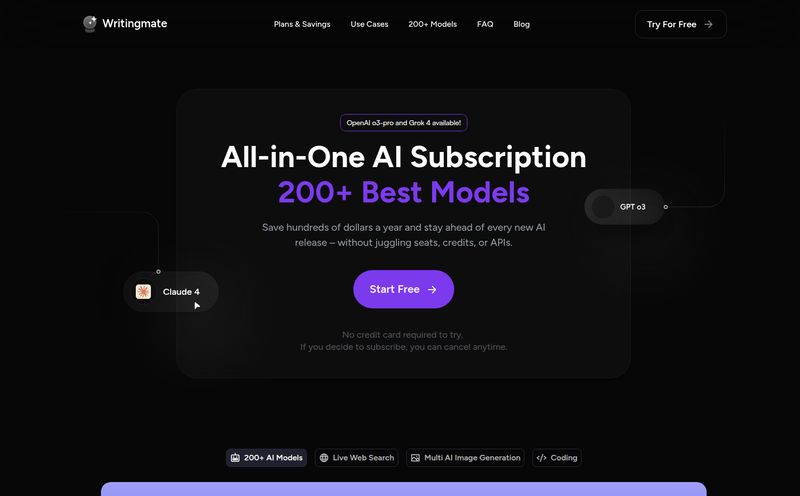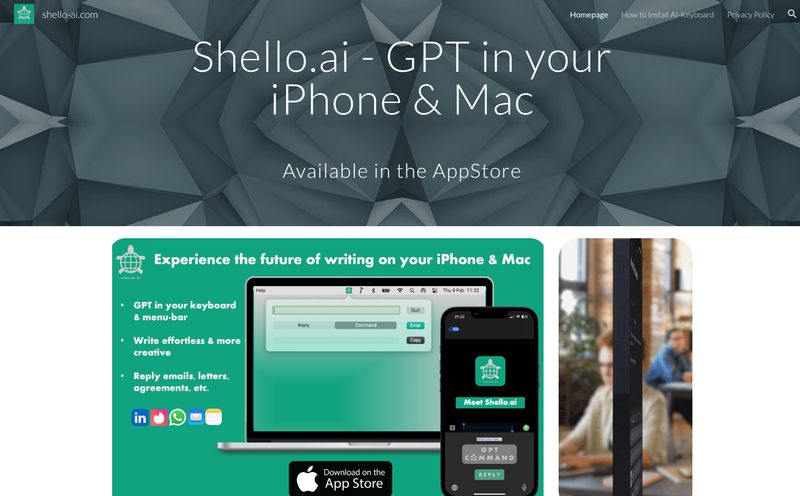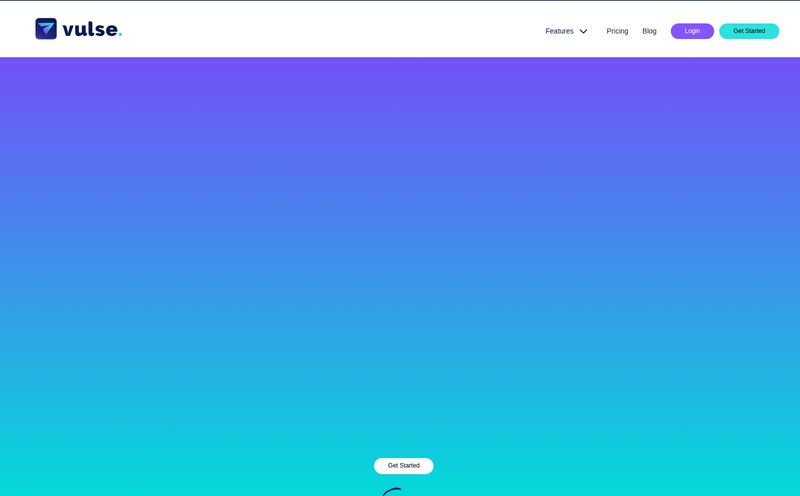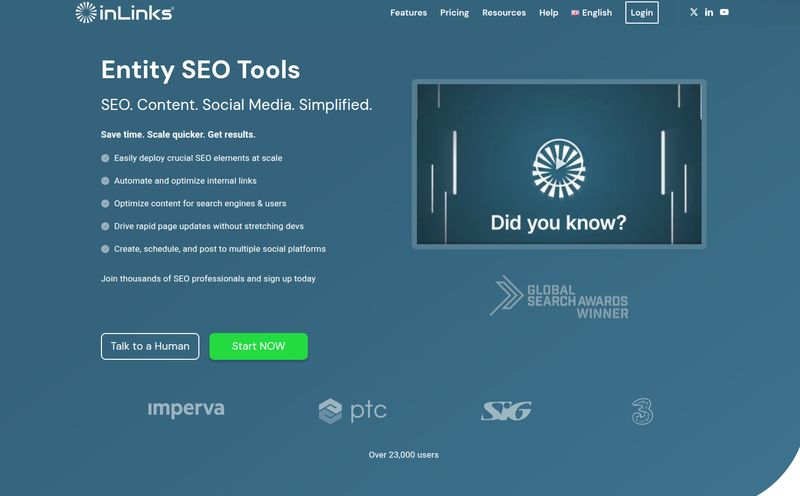The modern career path isn’t a path at all. It’s more like a chaotic, sprawling jungle gym built by a committee that never spoke to each other. One minute you're climbing a ladder, the next you're on a slide that leads to... who knows where? I’ve been in the SEO and digital marketing game for years, and I’ve seen trends and job titles appear and disappear faster than you can say “pivot.” It's confusing out there.
We’re all just looking for a map. Or a guide. Or at least a slightly-less-confused friend who can point us in a general direction. So when I heard about CareerHub AI, a platform that claims to be an “AI-powered platform for personalized career guidance,” my curiosity was definitely piqued. Another AI tool promising to solve all our problems? Color me skeptical, but intrigued.
Is this the AI career coach we've been waiting for, or just another shiny object in the ever-growing pile of tech tools? I decided to roll up my sleeves and find out.
So, What Exactly is CareerHub AI?
Think of it as a career co-pilot. CareerHub AI uses GPT technology—the same kind of brainpower behind tools like ChatGPT—to offer a suite of services aimed at demystifying the job-hunting process. It’s designed to be a one-stop shop for everything from figuring out what you want to be when you grow up (even if you’re already grown up) to actually landing the job.
The whole premise is that instead of endlessly scrolling through conflicting advice on Reddit or paying a fortune for a human career coach, you can get instant, personalized guidance from an AI. It’s free to use, which immediately lowers the barrier to entry. A big plus in my book.
Getting Started: First Impressions
Signing up was straightforward. No weird hoops to jump through. The interface is clean, maybe a little minimalistic, but that’s a good thing. It avoids the clutter that plagues so many other platforms. You’re not bombarded with a million options right away. Instead, it feels like it gently guides you toward what you need.

Visit CareerHub AI
You start by feeding it some information about your skills, interests, and experience. The more you give it, theoretically, the better the advice. This is the part where you have to put in a little work. The AI isn't a mind reader, after all. But it’s a far cry from those old multiple-choice career aptitude tests that told everyone they should either be a forest ranger or an accountant.
Breaking Down the Toolkit: A Look at the Features
This is where CareerHub AI really tries to shine. It’s not just one thing; it's a collection of tools. I spent some time playing around with each one, and here's my breakdown.
Finding Your Path with Career Discovery
This is the cornerstone of the platform. You tell the AI what you're good at, what you enjoy, and what you've done before. It then churns out a list of potential career paths that might be a good fit. I fed it a mix of my actual skills (SEO, content strategy, data analysis) and some hobbies (brewing beer, history podcasts). The results were... surprisingly decent. It suggested things like 'Digital Strategy Manager' and 'Content Marketing Director,' which make sense. But it also threw in 'Market Research Analyst for a Craft Beverage Company,' which was an interesting and creative leap. It’s a fantastic brainstorming partner, forcing you to think outside teh box you've put yourself in.
The AI Salary Estimator: Are You Getting Paid Enough?
Ah, the golden question. We all want to know what we're worth. The salary tool lets you input a job title and location to get a potential salary range. It's a great feature, but I'd take its output with a grain of salt. AI salary predictions are based on vast datasets, but they can miss the nuance of a specific company, your unique experience, or current market volatility. My advice? Use this as a starting point. A great one! But then cross-reference it with real-time data from sites like Glassdoor or Payscale before you walk into a salary negotiation.
The Job Application Arsenal: Cover Letters and More
Hate writing cover letters? You’re not alone. CareerHub AI has a generator that spits one out for you based on a job description. It also has a LinkedIn post generator to help you build your personal brand. These are massive time-savers. But here’s the thing about AI-generated text: it can be a bit... bland. A bit soulless.
| Feature | What It Does | My Two Cents |
|---|---|---|
| Career Path Discovery | Suggests careers based on your skills and interests. | Excellent for brainstorming and seeing new possibilities. |
| Salary Estimation | Provides an AI-driven salary range for specific roles. | A good starting point, but always verify with other sources. |
| Cover Letter Writer | Generates cover letters tailored to a job description. | Huge time-saver, but needs a human touch to stand out. |
| Interview Preparation | Offers practice questions and tips for upcoming interviews. | Very useful for calming nerves and preparing talking points. |
| LinkedIn Post Generator | Creates professional posts to boost your online presence. | Handy for consistency, but originality will get you further. |
I see these generators as a fantastic first draft. Let the AI do the heavy lifting of structuring the letter or post, then you come in and inject your own personality and specific anecdotes. That combination is what gets you noticed.
The Good, The Bad, and The AI
No tool is perfect. Let's have a frank chat about where CareerHub AI excels and where you should be cautious.
On the bright side, it’s an incredibly accessible and powerful tool, especially for being free. The ability to get instant feedback and ideas without scheduling appointments or paying fees is a game-changer for many. It can genuinely help people get unstuck and see opportunities they never would have considered. It’s a democratizing force in career planning.
However, its biggest strength is also its potential weakness: it all hinges on AI. The GPT technology it's built on is amazing, but it's not infallible. It can sometimes misunderstand context or generate advice that's too generic. The effectiveness of the entire platform rests on the quality of its algorithms and the data it was trained on. This isn’t a human who can read between the lines of your frustration or understand the subtle politics of your industry. It’s a machine interpreting data. A very, very smart machine, but a machine nonetheless.
What's the Price Tag on This AI Wisdom?
Right now? Zero. Zilch. Nada. CareerHub AI is currently free to use. This is fantastic and, frankly, a bit surprising given the range of features. However, one of the listed cons is that it "may require a paid upgrade for full access to all features." This suggests a freemium model might be on the horizon. My guess is they'll keep the core features free to attract a large user base and then potentially introduce premium tiers for more advanced analytics, more daily uses of the generators, or one-on-one-style coaching simulations. For now, though, you can get in and use everything without opening your wallet.
So, Who Is CareerHub AI Really For?
I see a few groups getting a ton of value out of this:
- Students and Recent Graduates: When you're staring at a brand new diploma and a world of options, the paralysis is real. This tool is perfect for exploring what's out there.
- The Career Changers: If you're 10 years into a job you dislike and want to know how your skills could transfer to a different industry, this is your brainstorming buddy.
- The "Stuck" Professional: Feeling stagnant but not sure what the next step is? CareerHub AI can provide that little nudge or fresh idea to get your wheels turning again.
- Anyone Who Hates Admin: If you'd rather do anything else than write another cover letter, the generators alone are worth the price of admission (which is zero!).
Final Thoughts: Is It Worth Your Time?
After spending a good amount of time with CareerHub AI, I’m walking away pleasantly surprised. It’s not a magic wand that will instantly land you your dream job. No tool is. But it is an incredibly useful, powerful, and well-designed compass. It can point you in the right direction, help you navigate tricky terrain like salary talks and cover letters, and give you the confidence to take the next step.
The key is to use it as a collaborator, not a replacement for your own critical thinking. Use its ideas as a launchpad. Use its drafts as a foundation. Combine the speed and data-processing power of AI with your own human intuition, experience, and personality. Do that, and you'll be unstoppable.
Frequently Asked Questions
- Is CareerHub AI really free?
- Yes, as of now, the platform and its core features are completely free to use. There's a possibility of future premium tiers, but the company hasn't announced any specifics yet.
- How accurate is the AI salary estimator?
- It's a good benchmark and starting point for research. However, AI predictions are based on general data and can't account for all variables. It's best to cross-reference the estimates with other sources like Glassdoor, Payscale, and recent job postings in your area for a more complete picture.
- Can CareerHub AI actually find and apply for jobs for me?
- No, it's a guidance and preparation tool, not a job board or an automated application service. It helps you discover paths, prepare your application materials (like cover letters), and get ready for interviews, but you still need to find and apply for the jobs yourself.
- Is the advice from the AI truly personalized?
- It's personalized based on the data you provide. The more detailed information you give about your skills, experience, and interests, the more tailored the recommendations will be. However, it's still an algorithm, so the 'personalization' won't have the same emotional intelligence or nuance as a human coach.
- What is GPT technology?
- GPT stands for Generative Pre-trained Transformer. It's a type of large language model developed by companies like OpenAI that excels at understanding and generating human-like text. It's the technology that powers many modern AI chatbots and content creation tools.
References and Sources
- For more on the technology behind the tool, read about GPT on OpenAI's website.
- To cross-reference salary data, check out Payscale and Glassdoor.
- For trends on AI in the workplace, this Forbes article provides good context.



